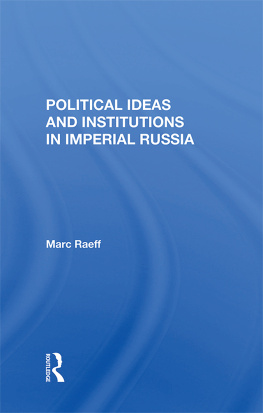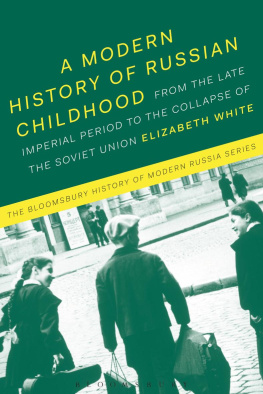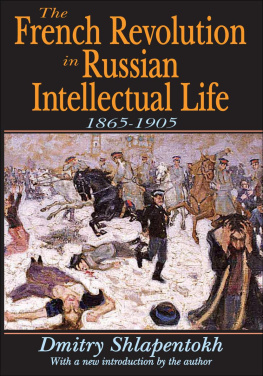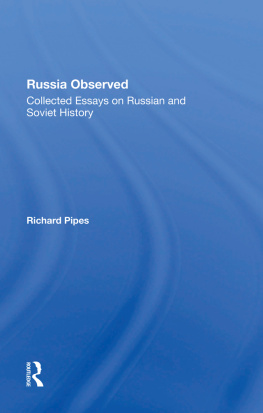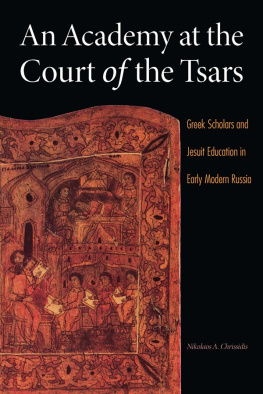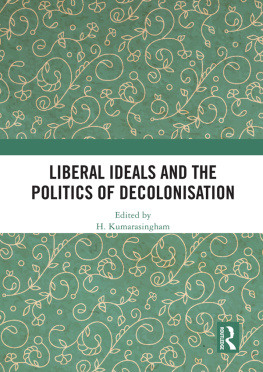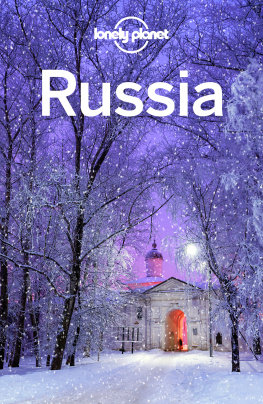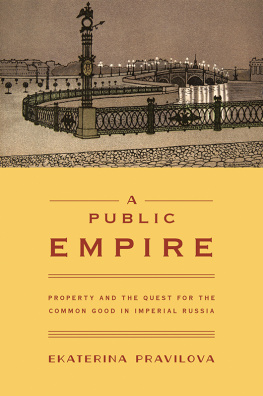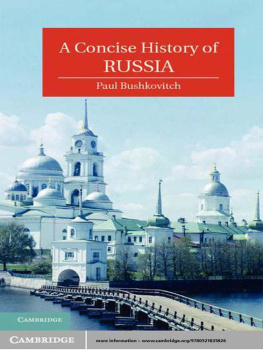First published 1994 by Westview Press, Inc.
Published 2019 by Routledge
52 Vanderbilt Avenue, New York, NY 10017
2 Park Square, Milton Park, Abingdon, Oxon OX14 4RN
Routledge is an imprint of the Taylor & Francis Group, an informa business
Copyright 1994 Taylor & Francis
All rights reserved. No part of this book may be reprinted or reproduced or utilised in any form or by any electronic, mechanical, or other means, now known or hereafter invented, including photocopying and recording, or in any information storage or retrieval system, without permission in writing from the publishers.
Notice:
Product or corporate names may be trademarks or registered trademarks, and are used only for identification and explanation without intent to infringe.
Library of Congress Cataloging-in-Publication Data
Raeff, Marc.
Political ideas and institutions in imperial Russia / Marc Raeff.
p. cm.
Includes bibliographical references.
ISBN 0-8133-1878-5
1. RussiaPolitics and government16891801. 2. Russia
Politics and government18011917. I. Title.
DK127.R25 1994
947dc20 93-48117
CIP
ISBN 13: 978-0-367-28344-5 (hbk)
To Edward Kasinec and his fellow librarians, whose enthusiasm and dedication make scholarship not only possible but exciting
Chapter 1 : "Russia After the Emancipation: Views of a Gentleman-Farmer," Slavonic and East European Review 29(73) (July 1951): 470-485. Reprinted by permission.
Chapter 2 : "A Reactionary Liberal: M. N. Katkov," Russian Review 11(3) (July 1952): 157-167. Reprinted by permission.
Chapter 3 : "Some Reflections on Russian Liberalism," Russian Review 18(3) (July 1959): 218-230. Reprinted by permission.
Chapter 4: "Russian Youth on the Eve of Romanticism: Andrei I. Turgenev and His Circle," in Alexander and Janet Rabinowitch with Ladis K.D. Kristof, eds., Revolution and Politics in Russia: Essays in Memory of B. I. Nicolaevsky (Bloomington: University of Indiana Press, 1972), pp. 39-54. Reprinted by permission.
Chapter 5: "At the Origins of a Russian National Consciousness: Eighteenth Century Roots and Napoleonic Wars," The History Teacher 25(1) (November 1991): 7-18. Reprinted by permission.
Chapter 6: "The Russian Autocracy and Its Officials," in Hugh McLean, Martin E. Malia, and George Fischer, eds., Harvard Slavic Studies, IV: Russian Thought and Politics (Cambridge, Mass.: Harvard University Press, 1957), pp. 77-91. Reprinted by permission.
Chapter 7: "Introduction" in Marc Raeff, ed., Plans for Political Reform in Imperial Russia, 1730-1905 (Englewood Cliffs, N.J.: Prentice-Hall, 1966), pp.1-39.
Chapter 8: "Russia's Autocracy and Paradoxes of Modernization," in Gerhard Oberkofler and Eleonore Zlabinger, eds., Ost-West-Begegnung in sterreich: Festschrift fr Eduard Winter ( Kln: Bhlau Verlag SMBH, 1976), pp. 275-283. Reprinted by permission.
Chapter 9: "Patterns of Russian Imperial Policy Toward the Nationalities," in Edward Allworth, ed., Soviet Nationality Problems (New York: Columbia University Press, 1971), pp. 22-42. Reprinted by permission.
Chapter 10: "Uniformity, Diversity, and the Imperial Administration in the Reign of Catherine II," in Hans Lemberg, Peter Nitsche, and Erwin Oberlnder in cooperation with Manfred Alexander and Hans Hecker, eds., Osteuropa in Gescbichte und Gegenwart: Festschrift fr G. Stkl Kln: Bhlau Verlag SMBH, 1977), pp. 97-113. Reprinted by permission.
Chapter 11: "In the Imperial Manner," originally published as "The Style of Russia's Imperial Policy and Prince G. A. Potemkin," in G. N. Grob, ed., Statesmen and Statecraft of the Modern West: Essays in Honor of Dwight E. Lee and H. Donaldson Jordan (Barre, Mass.: Barre Publishing Co., 1967), pp. 1-51. Reprinted by permission.
Chapter 12: "The Domestic Policies of Peter III and His Overthrow," American Historical Review 75(5) (June 1970): 1289-1310. Reprinted by permission.
Chapter 13: "The Empress and the Vinerian Professor: Catherine II's Projects of Government Reforms and Blackstone's Commentaries," Oxford Slavonic Papers 7 (New Series) (1976): 18-41. Reprinted by permission.
Chapter 14: "Pugachev's Rebellion," in Robert Forster and Jack P. Greene, eds., Preconditions of Revolution in Early Modem Europe (Baltimore and London: The Johns Hopkins University Press, 1970), pp. 161-202. Reprinted by permission.
Chapter 15: "State and Nobility in the Ideology of M. M. Shcherbatov," American Slavic and East European Review 19(3) (October 1960): 363-379. Reprinted by permission.
Chapter 16: "Muscovy Looks West," in Paul Dukes, ed., Russia and Europe (London: Collins and Brown, 1991), pp. 59-64. Originally published in History Today 36(8) (August 1986): 16-21. Reprinted by permission of History Today.
Chapter 17: "The Enlightenment in Russia and Russian Thought in the En Iightenment," in John G. Garrard, ed., The Eighteenth Century in Russia (Oxford: Clarendon Press, 1973), pp. 25-47. Reprinted by permission.
Chapter 18: "The Well-Ordered Police State and the Development of Modernity in Seventeenth- and Eighteenth-Century Europe: An Attempt at a Comparative Approach," American Historical Review 80(5) (December 1975): 1221-1243. Reprinted by permission.
Chapter 19: "Transfiguration and Modernization: The Paradoxes of Social Disciplining, Paedagogical Leadership, and the Enlightenment in 18th Century Russia," in Hans Erich Bdeker and Ernst Hinrichs, eds., AlteuropaAncien RgimeFrbe Nenzeit: Probleme und Methoden der Forschung (Stuttgart-Bad Cannstatt: Frommann-Holzboog, 1991), pp. 99-115.
Chapter 20: "Literacy, Education, and the State in 17th-18th Century Europe," transcription of a lecture given as the eighth annual Phi Alpha Theta distinguished lecture on history at the State University of New York at Albany on March 23, 1988 (brochure). Reprinted by permission of the Department of History, State University of New York at Albany.

